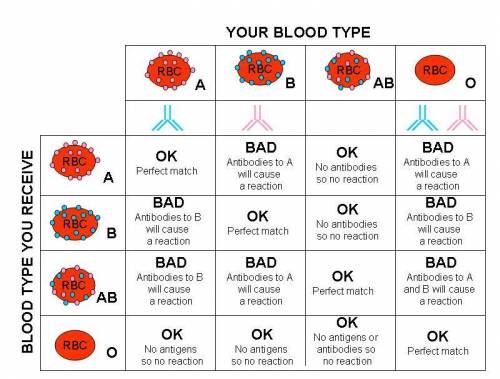

First report of known rare Rhnull phenotype individuals in Iran. Toward efficient enzymes for the generation of universal blood through structure-guided directed evolution. Your blood type determines who you can donate blood to, and whose blood you can receive.

Also, Rh-negative blood is given to Rh-negative patients, and Rh-positive or Rh-negative blood may be given to Rh-positive patients. ABO and Rh blood type frequencies in the United States. The universal plasma donor has type AB blood.You can learn more about how we ensure our content is accurate and current by reading our editorial policy. We link primary sources - including studies, scientific references, and statistics - within each article and also list them in the resources section at the bottom of our articles. Medical News Today has strict sourcing guidelines and draws only from peer-reviewed studies, academic research institutions, and medical journals and associations. Although it might one day be possible, doctors cannot currently change a person’s blood type. However, the researchers had to use very large quantities of the enzyme, and they did not test their theory in human participants. In theory, this would allow doctors to change a person’s blood type, potentially making it easier for them to get a transfusion. In 2015, researchers identified an enzyme that could “cut” antigens from blood cells. To be Rh-, the child must inherit two Rh- alleles. Dogs that are DEA 1.1 positive (33 to 45 of the population) can be considered to be universal recipients. This means that if a child inherits one Rh+ allele and one Rh- allele, the child will have Rh+ blood. The most important canine blood type is DEA 1.1. Parents pass on Rh factor in the same way. A parent who has O blood can only pass an O allele.Ī and B alleles are “ co-dominant.” This means that a child who inherits one of each will have AB blood.įor example, a mother with type A blood who passes on an A allele and a father with type B blood who passes on the B allele will have a child with AB blood. However, a child can have a different blood type to both of their parents, depending on which genes they inherit.Įach parent passes one allele (gene) for blood type to their child. There are more than 30 other known blood groups and more than 600 antigens.īlood type is a genetic trait. Some people, including those with Rhnull blood, lack one or more common antigens. For example, a person with AB blood and Rh factor has AB+ blood. A person without Rh factor has Rh- blood, while someone with it has Rh+ blood. In addition to the blood group type, a person may also carry Rh factor on their red blood cells. People with both A and B antigens have type AB blood, while people with neither antigen on their red blood cells have type O blood. Most blood types fall into one of four blood type groups, according to whether they contain A or B antigens.įor example, people with A antigens have type A blood, while those with B antigens have type B blood.

One Iranian woman with Rhnull blood had several pregnancy losses. For example, if their blood is incompatible with a developing fetus, pregnant women with rare blood types may experience complications. Having a rare blood type can make it difficult or even impossible to get a blood transfusion or organ transplant. The American Red Cross define a blood type as “rare” when it occurs in fewer than 1 in 1,000 people. If mismatched blood is given during a transfusion, the body may fight back, potentially endangering the life of the patient.Share on Pinterest Rhnull is the rarest blood type.

Our immune system recognizes the antigens present in our own blood type, but it may go into defense mode if it detects antigens from a different blood type. Our immune system works to protect us from such invaders as bacteria and viruses. When we account for A and B antigens as well as the Rh factor, we get the eight most common blood types: A+, A-, B+, B-, O+, O-, AB+ and AB. Blood types with the Rh factor are considered Rh positive, and those without it are considered Rh negative. In addition to the aforementioned A and B antigens, blood is classified based by the presence of the Rh factor. But assigning a letter is just the first step in determining your specific blood type. Type O negative blood is the only blood type with no antigens.īlood type A has an A antigen, while blood type B has a B antigen. This finding is an important step towards creating universal type O organs, which. Antigens are surface proteins found on red blood cells. A study has proved that it is possible to convert blood type safely in donor organs intended for transplantation.


 0 kommentar(er)
0 kommentar(er)
